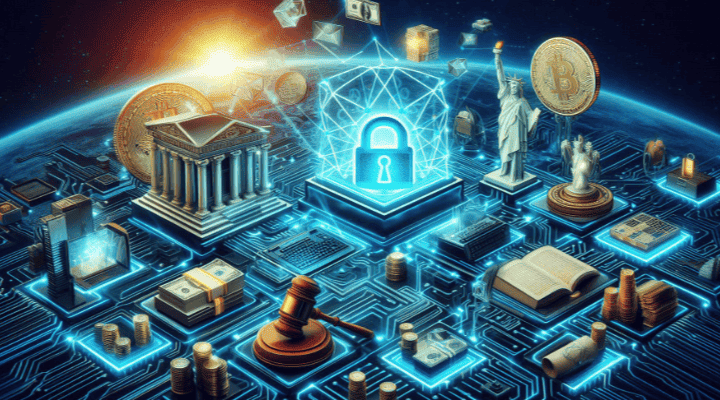Blockchain technology is revolutionizing government services and intellectual property (IP) protection, providing unprecedented levels of transparency, security, and efficiency. As governments and businesses increasingly adopt decentralized solutions, blockchain is emerging as a powerful tool to enhance digital governance, administrative efficiency, and rights management.
Blockchain in Government Services: Enhancing Efficiency and Transparency
Governments worldwide are leveraging blockchain technology to improve public administration, identity verification, record-keeping, and secure data transactions. The decentralized, immutable nature of blockchain ensures that records cannot be tampered with, reducing fraud and enhancing trust in government processes.
Key Applications in Digital Governance:
-
Identity Management & Verification
Blockchain-powered digital identity systems eliminate the need for redundant verification processes, allowing citizens to access government services with secure, tamper-proof credentials. Estonia and South Korea are pioneers in integrating blockchain-based identity solutions for e-governance. -
Voting Systems & Electoral Integrity
Blockchain-enabled voting systems ensure transparent, tamper-proof elections, reducing the risk of fraud while enabling remote voting. Countries like Switzerland and the United States have conducted blockchain-based voting experiments to enhance electoral integrity. -
Public Records & Land Registries
Blockchain-based land registries provide immutable proof of ownership, reducing disputes and eliminating corruption. Countries like Sweden and India are implementing blockchain solutions for real estate transactions and public record management. -
Supply Chain & Procurement Transparency
Governments use blockchain to enhance transparency in procurement processes, reducing corruption risks and ensuring accountability. By recording every transaction on a public ledger, authorities can track how funds are allocated and spent.
Blockchain for Intellectual Property Protection
As digital content creation surges, intellectual property protection faces increasing challenges. Blockchain provides a secure, timestamped, immutable record of ownership, helping creators, artists, and businesses protect their rights.
Key Applications in IP Protection:
-
Copyright & Digital Content Authentication
Blockchain allows creators to register digital assets, artworks, patents, and trademarks on a decentralized ledger, ensuring undeniable proof of ownership. This protects against plagiarism, piracy, and unauthorized use. -
Patent Registration & Licensing
Traditional patent registration is often lengthy and complex. Blockchain streamlines the process by automating smart contracts, allowing faster and more efficient licensing and royalties management. -
Anti-Counterfeiting Solutions
Brands use blockchain-based tracking systems to verify product authenticity, combating counterfeiting in industries like luxury goods, pharmaceuticals, and electronics. Companies like IBM and VeChain are leading the way in blockchain-powered authentication.
Challenges and Future Prospects
While blockchain adoption in government services and IP protection is growing, challenges such as scalability, regulatory uncertainty, and technological standardization remain. Governments and tech firms are actively collaborating to address these challenges and unlock blockchain’s full potential.
As blockchain technology continues to evolve, its role in enhancing governance, streamlining services, and protecting intellectual property is set to expand, transforming digital economies and public sector innovation worldwide.

 English
English
 Deutch
Deutch
 Espanol
Espanol
 Francais
Francais
 Portugues
Portugues
 日本
日本
 한국인
한국인
 Türk
Türk
 Русский
Русский
 Tiếng Việt
Tiếng Việt

